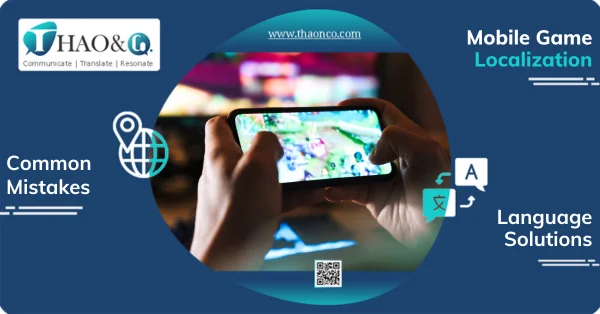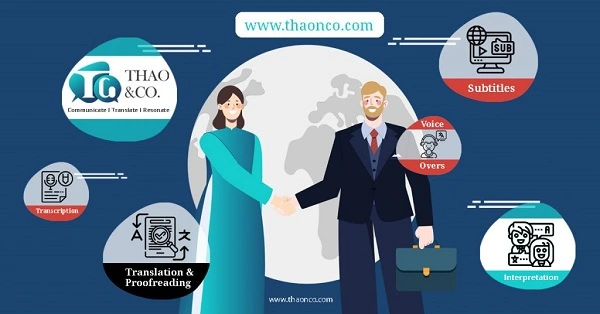The mobile gaming market is anticipated to achieve remarkable growth in the upcoming years. According to a study by data.ai and IDC in 2022, mobile games account for 61% of the total gaming industry market share, reaching a value of US$92.2 billion out of a market scale of US$184.4 billion.
While this signifies development opportunities for mobile game publishers, an increased level of competitiveness is also expected. Broadening the mobile game market is a pivotal objective for the majority of game publishers.
To successfully venture into new markets, game localization is a crucial task that requires meticulous investment. In this article, Thao & Co. will share insights into mobile game localization and strategies to avoid common mistakes.
Mobile game localization assumes a pivotal role in helping game publishers expand their market. Localizing mobile games can bring various benefits, including:
The mobile game market is dominated by two operating systems, Android and iOS. As a result, the translation process for mobile games needs to take into account the unique requirements of each operating system for optimal results.

Here are some common mistakes in mobile game localization:
Mere conversion of the game’s language to align with the target market does not guarantee a favorable reception from players in that market. Localization of the game becomes instrumental in resolving this predicament.
Localization goes beyond the translation of words with adjustments to graphic elements, gameplay, and more, ensuring alignment with the cultural nuances of the local players.
Therefore, publishers should consider conducting both translation and localization to maximize efficiency before the game’s official launch.
Unnatural translation is another critical issue in mobile game localization. Awkward or unnatural translations will result in a bad gaming experience. This is a huge turn-off and will quickly crush your game’s chance of getting purchased.
This can stem from the translator’s inexperience in the gaming industry and a lack of proficiency in the target language.
App Store Optimization (ASO) is a process that aims at increasing app store visibility and app conversion rate. It assumes paramount importance in elevating the visibility of the application on the App Store. However, when localizing games, publishers tend to neglect this phase, inadvertently forgoing opportunities to engage with the target player base.

Disparities in payment methods across regions can influence the game’s success within the target market. When entering a new market, players may find it difficult to access your game if only the language is adjusted without accounting for the local payment method. This will not only result in a negative customer experience but also impact the revenue stream of the game publisher.
Overlooking local app stores can potentially result in businesses missing out on a substantial pool of potential customers. While Google Play and App Store are by no means unfamiliar to most of us, local app stores are crucial bridges between game apps and players that game publishers should not disregard.
For instance, beyond the widely known app stores like Google Play and the App Store, China boasts platforms such as Tencent Myapp, 360 Mobile Assistant, and Baidu Mobile Assistant, which are also held in high regard by the locals.
Localization testing constitutes an indispensable step that cannot be circumvented before the game’s release. This phase facilitates the identification and prompt resolution of issues within the localized game version, including but not limited to spelling errors, display anomalies, inappropriate language, functional errors, and others.
With such potential adverse consequences, cutting corners when it comes to the testing phase of game localization would be the last thing publishers want to do.
How to ensure localization quality in mobile game apps? Here are some considerations.
When searching for a mobile game localization partner, game publishers should prioritize reputable agencies with native linguists possessing extensive experience within the gaming industry. This can ensure the quality of localizations while minimizing risks such as inappropriate language usage, inflexible and unnatural translations, etc.
If you are looking for a professional mobile game localization partner, consider the game, app, and website localization services at Thao & Co. Our team of highly experienced native linguists will help improve the localization quality of your game apps, giving you an edge in market expansion.

During the localization testing phase, conducting practical surveys with the target player base assumes paramount significance. This allows for a comprehensive evaluation of the localized game version, empowering game publishers to devise tailored solutions before the game’s launch.
To improve the localization quality, Thao & Co. also offers Consumer Language ResearchⒸ services. This service involves the collection, analysis, and measurement of content effectiveness within the target market, concurrently ensuring the quality control of localizations. As a result, the quality of game localization is guaranteed, with high accuracy and consistency.
The implementation of SEO translation serves to augment the visibility of the game app and foster closer connections with local players.
In this context, the quality of localization depends upon the judicious selection of keywords. Thao & Co. provides additional SEO Keyword Research services which entails creating a list of potential keywords to help enhance the quality of localization projects.
Above are some insights into mobile game localization that Thao & Co. wishes to share with you. Hopefully, this article has provided you with useful insights into this topic.
Should you need additional information or consultation on mobile game localization services, don’t hesitate to get in touch with Thao & Co. via our Get a Quote page for prompt assistance.